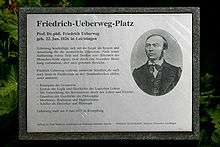Friedrich Ueberweg
Friedrich Ueberweg (German: [ˈyːbɐˌveːk]; 22 January 1826 – 9 June 1871), was a German philosopher and historian of philosophy.

Biography
He was born in Leichlingen, in Rhenish Prussia, where his father was a Lutheran pastor. Educated at Göttingen and Berlin, he qualified at Bonn as Privatdozent in philosophy (1852). In 1862 he was called to Königsberg as extraordinary professor, and in 1867 he was promoted to the ordinary grade. He married in 1863. Ueberweg died in Königsberg in 1871.[1]
Philosophy
At first he followed Friedrich Eduard Beneke's empiricism, and strongly opposed the subjectivistic tendency of the Kantian system, maintaining in particular the objectivity of space and time, which involved him in a somewhat violent controversy. His own mode of thought he preferred later to describe as an ideal realism, which refused to reduce reality to thought, but asserted a parallelism between the forms of existence and the forms of knowledge. Beneke and Friedrich Schleiermacher exercised most influence upon the development of his thought.[1]
Selected works
- De elementis animae mundi Platonicae (On the elements of the Platonic world of ideas), Dissertation, 1850
- Die Entwicklung des Bewußtseins durch den Lehrer und Erzieher (The development of consciousness by the teacher and educator, 1853
- System der Logik und Geschichte der logischen Lehren (System of logic and history of logic teaching), 1857;
- Über Idealismus, Realismus und Idealrealismus (On idealism, realism and ideal-realism), 1859
- Über die Echtheit und Zeitfolge der platonischen Schriften (On the authenticity and chronology of the Platonic writings), 1861
- Grundriß der Geschichte der Philosophie (Sketch of the history of philosophy), I–III, 1863–1866;
- Schiller als Historiker und Philosoph (Schiller as historian and philosopher), 1884
- Gesammelte philosophische Abhandlungen (Collected philosophical papers), 1889
His compendious Sketch of the History of Philosophy is remarkable for its fullness of information, conciseness, accuracy and impartiality.
References
- 1 2 Chisholm 1911, p. 556.
Sources
 This article incorporates text from a publication now in the public domain: Chisholm, Hugh, ed. (1911). "Ueberweg, Friedrich". Encyclopædia Britannica. 27 (11th ed.). Cambridge University Press. p. 556. Endnotes:
This article incorporates text from a publication now in the public domain: Chisholm, Hugh, ed. (1911). "Ueberweg, Friedrich". Encyclopædia Britannica. 27 (11th ed.). Cambridge University Press. p. 556. Endnotes:
- F. A. Lange, Friedrich Ueberweg (Berlin, 1871)
- Moritz Brasch, Die Welt und Lebensanschauung Friedrich Ueberwegs (Leipzig, 1889)